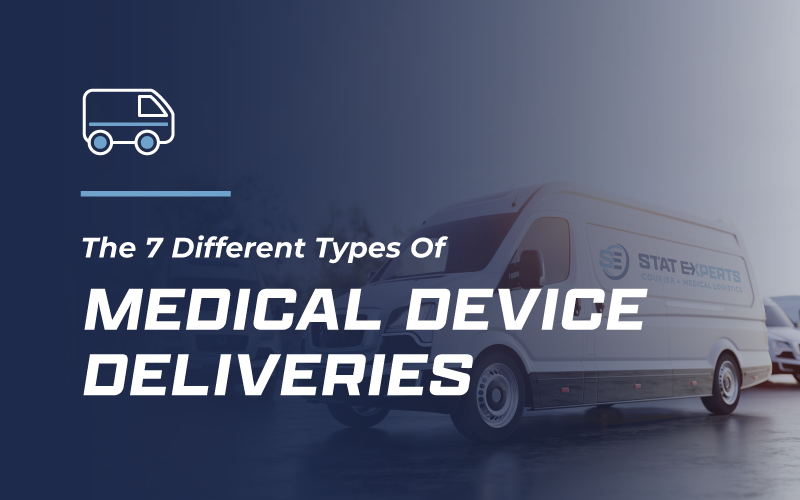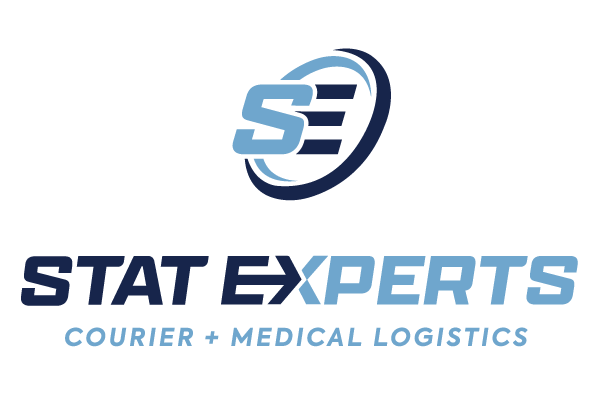Getting safe and timely deliveries of medical devices is of the utmost importance in the healthcare industry. If deliveries are delayed, damaged, or lost, the consequences can be severe.
Whether you need a kidney pump, ventilator, or oversized hospital bed delivered locally or long distance, Stat Experts’ medical fleet is prepared to handle any medical equipment delivery. We deliver your time-sensitive medical devices quickly and safely anywhere in the country.
Stat Experts can transport a large variety of medical devices. Let’s take a closer look at what our services can deliver.
Types of Medical Device Delivery
At Stat Experts, we train our team to handle most medical device shipments. There are several types of medical device deliveries, including:
Implantable Devices
These types of devices include things like prostheses or pacemakers.
Single-Use Devices
Our team is also trained to properly handle single-use devices such as syringes or catheters.
Medical Equipment
Additionally, team members know how to handle medical equipment like patient monitors and dialysis machines.
In Vitro Diagnostics
In Vitro diagnostics devices include things like glucometers and other blood tests.
Personal Protective Equipment
Personal protective equipment (PPE) includes anything like masks and gloves.
Imaging Devices
This type of device includes things like CT scanners
Surgical and Lab Instruments
These types of devices include things such as scalpels, forceps, scissors, retractors, and clamps.
Computer Hardware
For computer hardware, these kinds of devices can be things like x-ray imaging devices or data management systems.
The Classifications for Medical Devices
These types of devices can be placed into different classes. For example, the medical device classes set the basic regulations and protocols to follow when making medical device deliveries.
The classes are as follows:
- Class I (low-risk devices)
- Class II (moderate-risk devices)
- Class III (high-risk devices)
Class I — Low-Risk Devices
This medical device class is considered low-risk and includes things like elastic bandages and hand-held surgical instruments. Class I devices have the least regulatory control and do not require premarket clearance or approval.
Low risk refers to the level of risk associated with using the device. Class I medical devices pose the lowest level of risk to the patient and user compared to Class II (moderate risk) and Class III (high risk) devices.
In addition, low-risk devices are typically simple, non-invasive devices with minimal potential for harm if misused.
Class II — Moderate-Risk Devices
Class II medical devices are considered a moderate risk and include devices like powered wheelchairs and specific diagnostic imaging equipment. Class II devices are subject to more regulatory control than Class I and generally require premarket clearance or approval.
Moderate-risk devices typically involve more complex technology and have the potential for harm if misused.
Class III — High-Risk Devices
This medical device class is considered high risk and includes equipment such as implantable pacemakers and silicone breast implants. Class III devices are subject to the highest level of regulatory control and require premarket approval from the Food and Drug Administration (FDA) before being marketed.
High-risk devices are typically those that sustain or support life, are of substantial importance in preventing impairment of human health, or present a potential risk of illness or injury.
Stat Experts’ Medical Device Delivery Capabilities
At Stat Experts, our team members are trained to know the proper storage, handling, and transportation of any medical device; follow the regulations and standards set by the FDA; and understand and follow infection prevention and control.
Our team is ready to follow the appropriate storage, handling, and transportation protocols. If any device requires special handling, our team will ensure it is handled properly and arrives safely.
We regularly train our staff to stay up-to-date on the latest procedures and processes to keep your patients safe. At Stat Experts, we place patient safety and timelines at the forefront of our delivery services.
Why Choose Stat Experts?
With Stat Experts, you save time and money with medical device delivery. When you let us be an extended arm of your daily operations, you get access to our comprehensive services, including:
- Local courier offices
- Centralized dispatch
- Accurate and real-time record-keeping
- Automatic billing
- Fully controlled processes
- Personalized customer service
- Complete management of drivers, vehicle maintenance, insurance, and training
- Legal compliance
- Worry-free logistics
If you need help navigating the supply chain or delivering medical devices and equipment, our years of experience will get you on the right track.
Our team is ready to help lessen the logical stress of medical device deliveries. If you want to learn more about us or more about prices, reach out today to get a quote.


